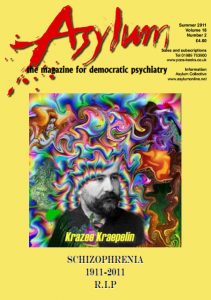It is one hundred years since an eminent psychiatrist published a book which announced an alarming kind of mental disorder – SCHIZOPHRENIA. This idea – the ‘split mind’ – brilliantly evoked the enigma of all those frightful psychoses which lack any apparent organic cause yet seem suddenly to afflict people in the prime of life.

But whether ‘split mind’ is a disease, in the sense of it having an organic cause, was and remains pure speculation. Perhaps this was psychiatry’s greatest ever PR coup: seeming to identify a bogey which frightened the public, yet at the same time offering the hope of an assault upon this ‘disease’ by means of progress in scientific research upon its exact nature and in finding an antidote.
In the meantime, and although no organic cause has been discovered (and not for want of trying), the idea of schizophrenia caught on rapidly. It still grips the popular imagination. (And certainly the imagination of most psychiatrists. Or perhaps we should say: the lack of imagination of most psychiatrists.) The notion of a disease called schizophrenia is so compelling because most people wish that such apparently unaccountable psychoses were due to a real illness.
Then the psychosis would be nothing to do with them, nothing they could do anything about, and best left to the doctors to ‘manage’ with medicine – just like any other illness that randomly afflicts the unlucky. During the last century many have tried to locate that elusive organic cause. A bio-chemical quirk? A genetic glitch? A virus? Researchers are still looking. However, quite a different idea about abnormal psychology happened to be emerging at the time of the celebrated ‘discovery’ of schizophrenia.
This alternative view argued that the best bet is that any functional mental disorder is due to the person suffering from psychological problems. (A functional mental disorder is one for which there is no clear organic cause. Most psychiatric cases are functional mental disorders. Misleadingly, they are known as ‘mental illnesses’.)
And so, if only the psychiatrist were to adopt the right approach and take the time to find out, any psychosis in late adolescence or early maturity might be accountable enough in terms of psychologically traumatised emotional and mental development under very difficult circumstances. As soon as it was proposed, a few of these dissenters did argue that the whole idea of the disease of schizophrenia was quite wrong.
Nowadays probably a rather greater number of people (although still a small minority) argue that the diagnostic category has had its day. Despite a hundred years of research no organic cause has been found, and there is now much evidence that the origins of most psychoses are to be discovered in psychological trauma during childhood.
If there really is no such thing as a disease called schizophrenia, stigmatising people with that diagnosis and poor prognosis, and maltreating them with dangerous psychiatric chemicals, does absolutely nothing to help anyone understand what is going on — especially when the individual concerned is already overloaded with psychological and social problems. On the contrary, the diagnosis and the medical treatments are perilously obstructive to recovery. The diagnosis of schizophrenia has blighted countless lives. Surely it is time to call it a day for this particular mythical disease?
Contents
- Special issue: Schizophrenia 1911-2011 R.I.P.
- Editorial: Schizophrenia 1911-2011 R.I.P.
- How Psychiatry arrived at the idea of Schizophrenia. Alec Jenner
- Emails from Georgie. Paul Hammersley
- Schizophrenia: Myth and Reality. Phil Virden
- Split: Schizophrenia, Dissociation and the Shattered Self. Eleanor Longden
- A History of Treatments for Schizophrenia and Depression. Peter Bullimore
- Book Review: the Meaning of Madness. Reviewed by Eleanor Longden
- Spaceships. Phil Thomas
- Schizophrenic Vehicle Repairs. Paul Hammersley
- Aspergers Syndrome and Schizophrenia: Exploring the overlap between the two diagnoses. Alison Tierney.
- The Case Against Schizophrenia. P F Thomas
- Let’s Lose the Label. Jen Kilyon
- Poem. “I don’t hear voices” by Lucy Gorecki
Asylum-18.2-2011-RIP-Schizophrenia_compressed” toolbar=”top”]
